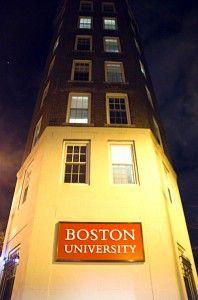
Although Boston University does not pay Boston property taxes, the institution, with about 40,000 students and staff members, indirectly funds many city initiatives, according to multiple BU fiscal reports.
BU generally has an economic impact on the city of about $1 billion annually and it voluntarily pays millions of dollars to the city in lieu of conventional taxes each year, according to recent BU reports.
This past year, BU paid a record amount to the city, more than $5 million, said BU spokesman Colin Riley.
Instead of paying Boston property taxes, many tax-exempt institutions in the city, such as BU, elect to pay a fee to the city. Many institutions have boosted their payments this year, according to recent city and school reports.
“Last year our PILOT contribution was $4.6 million and this year it is over $5 million,” Riley said.
PILOT, or ‘payment in lieu of taxes,’ refers to the name of the program Boston Mayor Thomas Menino attempted to codify in 2009 to “examine the relationship between the City and tax-exempt institutions, specifically the major educational and medical institutions,” according to the city of Boston website.
In fiscal year 2010, of the 36 institutions that made PILOT payments, BU contributed the second largest amount, about 14 percent of the total contribution, according to a 2010 fiscal report.
BU also pays fees in lieu of property taxes to Brookline, Riley said, because of its property near the school’s West Campus.
“The payment reflects the support and commitment that BU made to the city,” Riley said. “Historically, we have been the leader of other universities in making the most significant payment to the city.”
The city asks educational, medical and some cultural institutions to pay about 25 percent of what they would pay in property taxes to the city, according to a PILOT Task Force report.
Some of that money funds local government services, especially the services the institutions tend to use frequently, such as “police protection, fire protection [and] snow removal.”
The city has received $9.4 million since July, according to a Boston Globe article, and many of the institutions involved in the PILOT program boosted their payments this past year.
Northeastern University, for example, has already paid $443,000 for the first half of the fiscal year, according to the Globe.
In 2010, NEU paid about $30,000 over the course of the entire fiscal year, according to a 2010 fiscal report.
CORRECTION: Since BU is a non-profit educational institution, the article assumed that BU doesn’t pay any real estate taxes. However, the university does pay property taxes on any commercial property it owns. In Fiscal Year 2011 (July 1, 2010 to June 30, 2011), Boston University paid $4,917,565 in net real estate taxes in addition to the $5,106,986 in PILOT for total direct payments to the City of Boston of $10,024,551.






















































































































